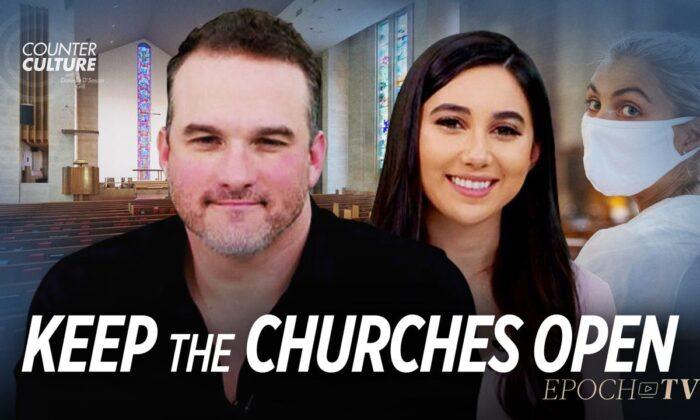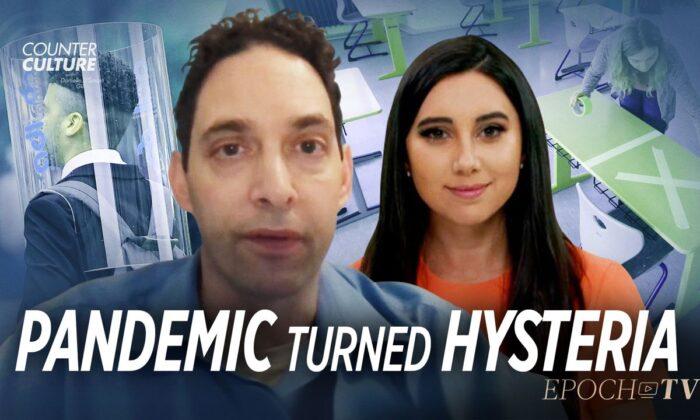If you haven’t been following Sam Sorbo’s series “School’s Out,” now is really the time for you to start. Things are getting bad with public schools, folks—worse if you live in a blue state. Between mask mandates, potential vaccine mandates, and school boards sneaking everything from critical race theory to porn into curricula, it’s really getting to be just about that time when many of us won’t have a choice but to pull our children from public schools to save them from either being completely indoctrinated or injected with a vaccine that, no matter what anyone says, is still in the early stages of clinical trials time wise. So hopefully you’ve been following “School’s Out with Sam Sorbo,” and if you haven’t, you should take some time to catch up.
In this episode “Sacrifice,” Sorbo discusses topics well beyond our imploding, corrupted education system to address what is easily the number one issue holding most parents back from homeschooling: the kinds of sacrifices they would need to make to pull their children out of school. She begins the episode by stating a truth more and more feminists have only begun to realize once they hit their 40s and decide they want children—humans only have so much time. Whether it’s hours in a day or childbearing years, the idea that we can “have it all” has increasingly been revealed as the myth that it is, though perhaps it would be better to say the myth is that we can “have it all at once.” It is indeed possible to have a family and a career, but with just 24 hours in a day, sacrifices will always need to be made for what is deemed most important, and maybe during a child’s formative years it’s the career that should take a back seat.
Knowing families face such tremendous pressure to have two cars in the garage, the latest iPhones, and a five bedroom house on a cul-de-sac in the nicest suburb, Sorbo uses a round-about way of reframing the idea of sacrificing for our children that doesn’t require anyone to think about giving up their weekly manicures or weekend golf. Instead, she reframes the idea of sacrificing for something you truly want using the analogy of going to see your favorite band in concert. It’s a fantastic analogy, one sure to make anyone think—particularly if their favorite band has retired, broken up, or their favorite artist has died (I’ll always miss you, David Bowie). Sorbo uses relatable dollar amounts and potential sacrifices to get the viewer thinking about what they would willingly give up to see a musical act they knew they could never see again. It’s easier to mull over taking on an extra shift at work for a while to cover a $500 ticket than it is to think about how to change a family’s lifestyle or pursue a different career with more flexibility, and that’s why it’s effective. It’s also apropos, as each year that passes in our children’s lives is a kind of last performance. A child will only take their first steps once; say their first word once; learn to ride a bike once; and we’ve been actively encouraged to outsource most of those firsts to others, whether it’s daycares, nannies, or teachers.
When it comes to sacrifice, Sorbo isn’t just a well-off celebrity preaching to the little people from her posh estate on something she really knows nothing about. She relates the story of her husband, Kevin Sorbo, having a stroke while at the height of his fame when they weren’t yet married. Anyone of a certain age may remember when his show at the time, “Hercules,” began to inexplicably shift away from the title character, as well as the revelation in 2012 that it was because he’d suffered a series of strokes (I certainly do). What many probably don’t know is that Sam Sorbo effectively dropped her budding acting career to stay with him in the hospital, while she had also been called about landing a national television commercial at the same time he was in the ICU.
That probably doesn’t sound like much to those outside the entertainment industry, but Sorbo isn’t exaggerating when she tells her audience that a national commercial in the 1990s was a very big deal. You had an audience from coast to coast. You got great residuals. You could easily get noticed for bigger and better parts. It could be the big break you’d been chasing for years. If you landed a national commercial you did not turn it down for anything, certainly not for something as piddling as a hospitalized fiancé, not unless you wanted to shoot your career in the foot. Yet Sorbo did exactly that, even though the future for that hospitalized fiancé looked very bleak at the time. When Sorbo talks about sacrificing for family, she’s speaking from experience.
It isn’t the only personal story of sacrifice she relates to build a bond with her viewers. When her children were very young, the Sorbos moved back to California and she decided to touch base with her agent to see if he could get her any small roles. After a series of auditions, she returned home one day to have her youngest child scold her for leaving, and again walked away from her career. The irony in telling this story is how well Sorbo dispels a secondary myth about “having it all” that is particularly noxious for women; the idea that you can only “have it all” when you’re young. Now that her children are older, her career is thriving again in ways she never could have imagined. Indeed, this is a story many women tell, of beginning a whole new chapter for themselves later in life once their children are older and don’t rely on them in the same ways as they did when they were little. It immediately makes the idea of sacrificing a corner office for a homeschool seem much more palatable and possible.
Sorbo then touches on our modern culture, which currently insists that money and career should always be more important than family and the singular requirement for a happy life. It’s a strange place to have arrived when our betters have been so adamant for so many years that the 1950s father who spent all his time at the office climbing the corporate ladder was cold and neglectful. Only now, they claim that mothers must also focus exclusively on climbing the corporate ladder if they want to feel fulfilled. We’ve gone from shaming fathers for not spending enough time with their families to shaming mothers who spend too much time with their families. In this respect, Sorbo goes so far as to say that children are actively devalued when framed in a debate of family versus career, and I doubt many would argue otherwise. We’re increasingly told children are a burden, not a blessing. Media outlets are always quick to report on how expensive it is to raise a child from birth to age 18. We’re hammered by warnings about overpopulation and how irresponsible it is to have children when the planet is dying thanks to climate change. Op-eds are everywhere from hand wringing millennials opining about grappling with their selfish desire to have children when they know they’d be bringing them into such a terrible world. No, Sorbo isn’t wrong at all about children being seen as unimportant, inconsequential, or obstacles to moving up the chain of command.
Even so, she argues that the time she has invested in her relationship with her children more than makes up for any potential loss in status or money from her career, returning the discussion to one of education. She recognizes that it’s often easier as parents to ship our children off to school for others to discipline and teach than to make the necessary sacrifices to do it ourselves, especially when society demands more than ever that we keep up with the Joneses. Still, she insists that we must begin to sacrifice our short term wants for the long term goal of raising well educated, well rounded, well behaved children. Public schools certainly aren’t going to do that, not when their current goal is merely to make sure students can absorb and regurgitate enough material to pass mandated tests. Whether they understand that material is a bonus, not the point of modern education.
Sorbo’s final personal story highlights the difference between education as seen from a homeschooling perspective versus that of a public school parent, highlighting how public education divides parents from their children by their very nature. Her reasoning is not only entirely sound but again completely relatable, as she talks about having to help her son with a project at the same time as a friend who kept her son in school. Her friend’s experience helping to build a diorama was miserable, because she’d been coerced by the school into working on the project with her son rather than freely giving her time the way Sorbo had. Whether her friend might have wanted to help her son anyway becomes irrelevant when she had been forced to do so by the school. It removed the concept of free exchange, a topic Sorbo has touched on in previous episodes, and therefore breeds resentment. Sorbo, by contrast, willingly gave up her time in order to further build a relationship with her son, and ended up having a great time.
At the end of the episode, Sorbo argues that parents must begin to sacrifice their own needs for their children’s welfare, especially when it comes to their education. She further insists that this kind of sacrifice can lead parents to tremendous personal growth as well, and I have no reason to doubt her. Whether you have children in school and have been thinking about pulling them out, know someone who has, or just want to stay aware of these issues, you must watch and share this episode of “School’s Out with Sam Sorbo,” and then go back to catch up on any episodes you may have missed.
Follow EpochTV on social media:




